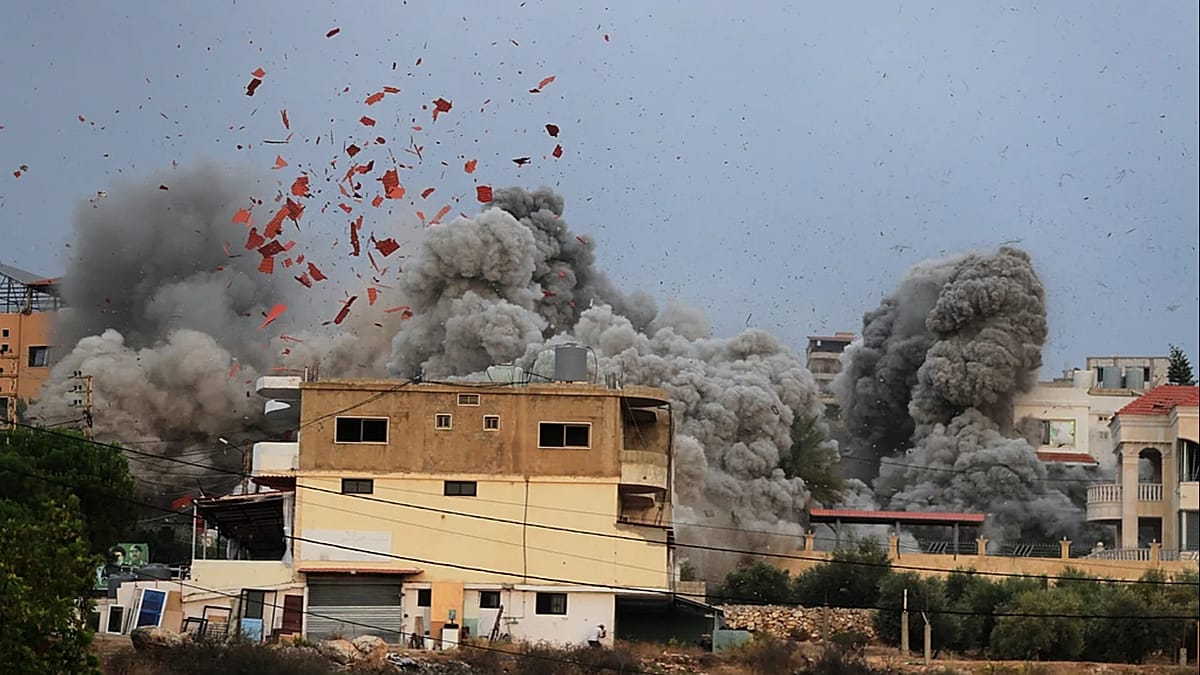By Jerry Fisayo-Bambi with AP
Published on 07/11/2025 – 7:44 GMT+1
•Updated
7:48
Israeli jets struck several towns in southern Lebanon on Thursday after urging residents to leave, marking an escalation in their near-daily strikes on the country.
The airstrikes came hours after militant group Hezbollah urged the Lebanese government not to enter negotiations with Israel.
According to Israeli Arabic spokesperson Avichay Adraee, residents in Tayba near the border, Teir Debba located just east of the coastal city of Tyre, and Aita al-Jabal in southern Lebanon, were given advance warning to flee 500 metres away from residential buildings Israel was targeting.
Adraee said the buildings were being used by Hezbollah. Later, more warnings were issued for the towns of Zawtar al-Sharqiyah and Kfar Dounin.
The Israeli military said “it targeted military infrastructure for Hezbollah in those areas, including ‘weapons storage facilities… constructed in the centre of civilian-populated areas.”
It accused the group of rebuilding its capabilities almost a year after a US.-brokered ceasefire went into effect that ended a month-long war.
While most residents evacuated the threatened areas ahead of the strikes, Lebanon’s health ministry reported one person wounded.
“We will not allow Hezbollah to rearm themselves, to recover, build back up its strength to threaten the state of Israel,” Israeli government spokesperson Shosh Bedrosian said at a briefing Thursday.
Strikes come amid Lebanese plan to disarm Hezbollah
The strikes came as Lebanese Prime Minister Nawaf Salam and his government met in Beirut to follow up on a plan drafted by the Lebanese military to disarm Hezbollah and other non-state armed groups in the country.
Information Minister Paul Morcos said, following the meeting, that the cabinet “commended the progress (the army) has made… despite continued obstacles, foremost among which is the continuation of Israeli hostilities”, while Lebanese President Joseph Aoun criticised the strikes, saying that “every time Lebanon expresses its openness to peaceful negotiations… Israel intensifies its aggression.”
“Nearly a year has passed since the ceasefire came into effect, and during that time, Israel has spared no effort to demonstrate its rejection of any negotiated settlement between the two countries,” he said.
“Your message has been received.”
Israel says its near-daily strikes have targeted Hezbollah officials and military infrastructure, while the Lebanese government, which has backed disarming Hezbollah, say the strikes have targeted civilians and infrastructure unrelated to the Iran-backed group.
Hezbollah has refused to disarm, and its commander, Sheikh Naim Kasse, has stated that the group will be prepared to fight regardless of how reduced its capabilities may be.
But analysts say Israel’s fierce air campaign over southern Lebanon, which began in September 2024, already significantly weakened the group’s military capabilities.
Both sides have accused each other of violating the ceasefire, which nominally ended the Israel-Hezbollah war last November.
The conflict started when Hezbollah began firing rockets into northern Israel in support of Hamas and the Palestinians, prompting Israeli airstrikes and artillery shelling in return.
According to Lebanon’s health ministry, more than 270 people have been killed and around 850 wounded by Israeli military actions since the ceasefire took effect.

